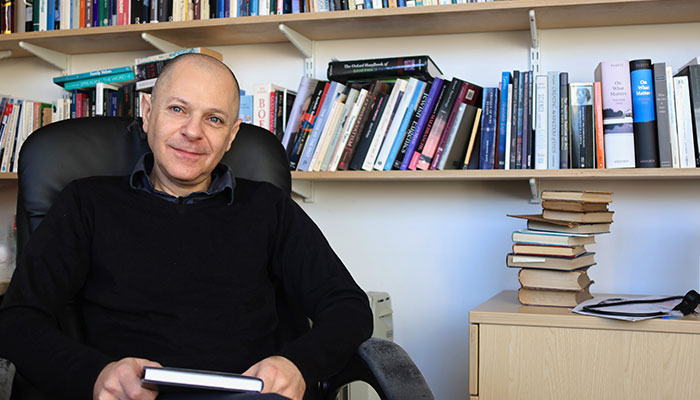Everyone loves a good conspiracy theory – that the moon landing was faked, global warming is a Chinese hoax, Covid was a biological weapon, the mafia and/or the FBI assassinated John F. Kennedy.

Belief in conspiracy theories is widespread, says Neil Levy, Professor of Philosophy at Macquarie University. A recent Washington Post poll reports that more than one-third of Americans believe that Joe Biden stole the 2020 presidential election from Donald Trump.
“Observers often ask ‘How can people believe things like that, given how thin the evidence is?’
“And the evidence isn’t just thin. When we look at what people say in defence of their conspiratorial beliefs, they’re (literally) not even trying. They’re not citing real evidence at all: they cite memes and word games. For example, citing a still from a movie as evidence that Covid-19 was planned or that ‘Delta omicron’ is an anagram of ‘media control’.
“The explanation? People are playing a game.”
The rise of the “serious player”
Conspiracy theories are engaging and often entertaining, he says.
“Just as the person who watches a conspiratorial film suspends disbelief for its duration, so many conspiracy theorists do not believe the theories they endorse; rather, they suspend disbelief in them.”
We all like games, and “conspiracy theory” is a fun game, says Professor Levy.
There’s a ready audience for this sort of story. Some who report believing a conspiracy theory are just enjoying the fantasy and know exactly what they’re doing.
Just look at the many films and TV shows that feature them: The X-Files, Capricorn One, The Bourne Identity and its sequels, JFK, The Americans, The Truman Show, Homeland. Then there are the criminal conspiracies or conspiracies to hide police corruption: Serpico, L.A. Confidential, The Departed, at least one season of Fargo, Line of Duty, and many others.
Says Professor Levy: “Thinking that ‘the moon landing was faked and NASA employed Hollywood directors is fun; it’s a cool story. Thinking ‘aliens built the pyramids’ is fun. Serious players are simply people having this sort of fun but who take it seriously: they deny to themselves that they’re playing.

Serious fun: While the idea that aliens built the pyramids is fun for most, Professor Levy says serious conspriacy theorists cross over into dangerous territory when they mistake fantasy for a belief.
“It’s true that some people are indeed true believers who do their own research, and very occasionally turn out to be right (Watergate began with a lot of speculation, but it turned out there really was a conspiracy).
“But it’s important to recognise conspiracy theories as cultural products that reflect playfulness and ingenuity. If they weren’t dangerous, perhaps we could even appreciate them as an artform of a kind.”
When does a fantasy become a belief?
We all enjoy stories that cast our side as heroes, he says. “That’s what conspiracy theories typically are: they [others] are bad; we are exposing them.
“There’s a ready audience for this sort of story. Some who report believing a conspiracy theory are just enjoying the fantasy and know exactly what they’re doing.
“Many more are enjoying the fantasy and don’t know what they’re doing: they’re mistaking their imaginings for a belief. But they recognise it’s a fantasy at some level: that’s why they’re content with ‘evidence’ that is really just a game.
- Screen test: paper still wins over devices in the reading stakes
- A stargazer's guide to heavenly events in 2024
People might not be more sceptical about evidence, Professor Levy says, but there’s a greater acceptance of people strategically ignoring evidence in public. Because prominent political figures do it, everyone is more emboldened.
Conspiracy theories, he says, are more visible these days, although not necessarily more common. “Social media allows for their rapid dispersal,” Levy says. “It’s important to note that much of that visibility comes from people sharing posts to mock conspiracy theories, not to take them seriously.”
Same same, but different
So, do conspiracy theorists share a common profile?
Says Professor Levy: “According to American political scientist Joseph Uscinski, a prominent researcher in the field, ‘conspiracy theories are for losers.’ By that he means that people on the losing side of elections and those who are losing out on life (often for reasons that are not their fault) are more likely to buy into conspiracy theories.
“Part of the reason for this is simply that mainstream explanations often don’t glorify their side. Excuses like ‘My party ran an inferior campaign’ or ‘My candidate wasn’t good’ or even ‘The other side was more in tune with the electorate’ don’t make you look good. So you turn to a conspiracy theory: ‘They cheated’.”
Just how dangerous are conspiracy theories? It depends on the context, says Professor Levy. They’re risky because we can easily forget they’re a game we’re playing. A lot depends on our social network: if the people around us don’t take them too seriously we can indulge ourselves without too much danger. If our social network believes them or pretends to, we can easily become absorbed in them.
Cultural shape-shifting
Even when conspiracy theories are not believed, they can be detrimental, he says. They distract from more important things.

Influence: Conspiracy theories such as the USA's 'stolen' election wield power over political discourse says Professor Levy, pictured above.
“For example, people may not believe ‘global warming is a Chinese hoax’, but time spent rebutting it would be better spent talking about solutions to climate change. They also shape politics: In the US, Republicans may not believe the election was stolen, but as long as their voters pretend to believe that, legislators have good reason not to engage in any consensus-building with Democrats.”
But we also enjoy conspiratorial narratives for their own sake, it seems. We enjoy the ingenuity with which they knit together and explain apparently disparate and unrelated facts, says Professor Levy.
“Conspiracy theories don’t have to be fanciful, though they typically are. They could be reasonably mundane: what marks them as conspiracy theories is that there are much better explanations of events available.
“No one wrote a bestselling book about the house in which the groans and bumps in the night were caused by squirrels,” he says. “The mundane is, well, mundane.
“We love the idea that the mundane is infused by magic.”
Neil Levy is a Professor in the Department of Philosophy at Macquarie University. His research paper 'Conspiracy Theories as Serious Play' was published in the journal Philosophical Topics.



